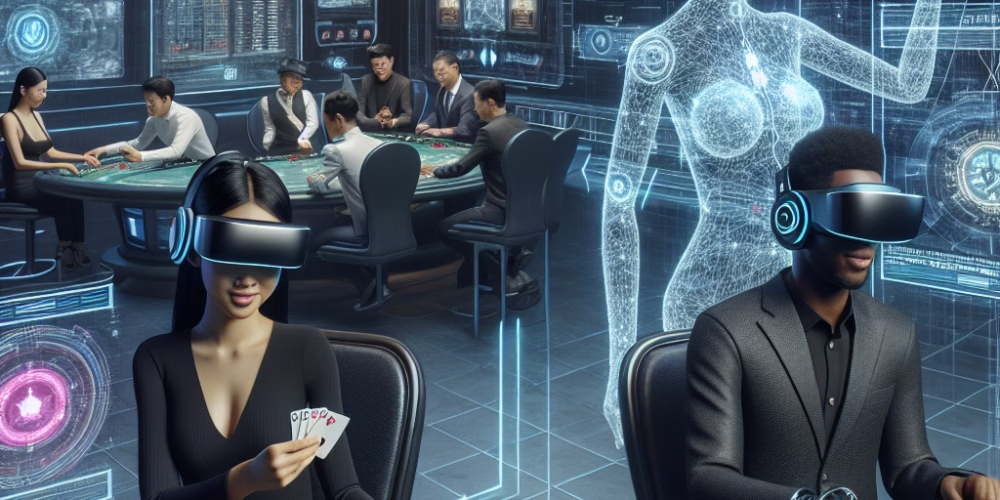Revolutionizing the Casino Experience with VR Technology
In an exciting development within the gaming and casino industry, virtual reality (VR) technology is changing the way players engage with gambling and gaming environments. This innovative approach not only enhances user experience but is also expected to redefine the standards of casino gaming globally.
The Emergence of VR Casinos
Virtual Reality technology, which integrates simulated environments with user interaction via specialized equipment, has now made its way into the casino sector. Recently, several leading casinos have announced the launch of VR-based platforms that allow players to enjoy a realistic gaming environment from the comfort of their homes. These platforms offer a variety of games, including slots, poker, and blackjack, in a fully immersive setting that mimics the experience of visiting a physical casino.
One of the pioneers in this initiative, VR Casino Inc., launched its platform earlier this month, attracting considerable attention from both players and investors. According to VR Casino Inc.’s CEO, Johnathan Doe, “VR technology enables us to offer an unprecedented gaming experience that combines the thrill of live gambling with the convenience of digital platforms.”
Enhancing Player Experience and Accessibility
The introduction of VR casinos is particularly significant in making high-quality gambling experiences more accessible to a global audience. These platforms are not limited by geographical boundaries, allowing users from around the world to connect and engage in real-time. Furthermore, VR casinos are designed to be highly interactive, providing players with options to customize their avatars, interact with other players, and navigate through various gaming floors and rooms.
Industry Impact and Future Trends
The shift towards VR-based casinos is expected to have a profound impact on the gaming industry. It opens up new avenues for revenue and market expansion, as traditional barriers like location and capacity no longer restrict casino operators. Moreover, the VR gambling market is anticipated to grow exponentially over the next few years. Market analysts predict that the integration of VR in online gambling could generate revenues exceeding $520 million by 2025.
Analyst Emily Hughes from Global Gaming Insights points out, “The adoption of VR technology in online casinos represents a significant technological leap. This could very well set a new standard in the industry, impacting everything from user engagement to regulatory frameworks.”
Technological Challenges and Regulatory Considerations
Despite the promising prospects of VR casinos, there are several challenges that need to be addressed. Technological issues such as latency, compatibility with different devices, and the cost of VR equipment could potentially hinder widespread adoption. Additionally, regulatory bodies are closely monitoring these developments to ensure fair play and prevent problematic gambling behaviors in an immensely immersive environment.
FAQs about VR Casinos
Q: What do I need to start playing in a VR casino?
A: To play in a VR casino, you generally need a VR headset and compatible gaming controls. Additionally, you’ll need to create an account with a VR casino provider.
Q: Are VR casino games fair?
A: Yes, reputable VR casinos operate with the same level of fairness and regulatory oversight as traditional online casinos. They use RNG (Random Number Generator) systems to ensure game outcomes are entirely random.
Q: Can I interact with other players in a VR casino?
A: Yes, one of the key features of VR casinos is the ability to interact with other players in real time. You can chat, participate in games together, and more.
Q: Is real money involved in VR gambling?
A: Yes, most VR casinos allow you to gamble with real money, similar to traditional online casinos. Ensure the platform is licensed and regulated before making any deposits.
Key Takeaways
– VR casinos offer a realistic and immersive gaming experience, merging the thrill of traditional gambling with modern technology.
– They provide accessibility and convenience, allowing a global audience to participate.
– The industry faces challenges such as technological barriers and regulatory scrutiny.
With innovative strides such as these, the future of casino gaming looks both exciting and promising, as it continues to blend cutting-edge technology with traditional gambling paradigms. Players and industry stakeholders alike are keenly watching this space to see how VR will ultimately reshape the gambling landscape.

Erik Agary is a seasoned writer at True Games Reviews, specializing in gaming, casino games, and interactive entertainment. With a passion for all things digital, Erik dives deep into the latest trends and developments in the gaming world, offering insightful reviews and detailed analysis. His expertise spans across multiple gaming platforms, ensuring comprehensive coverage that resonates with both novice and experienced gamers alike.


